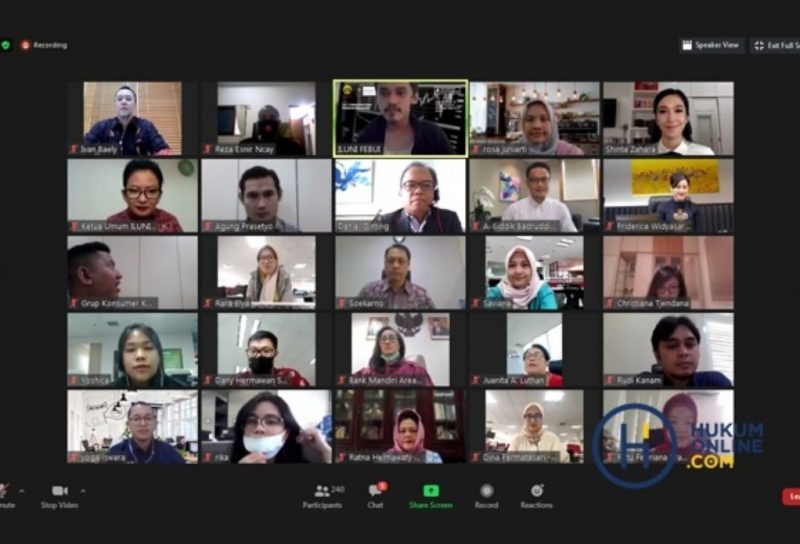The impact of the Covid-19 pandemic hit the national economy in various layers, especially the business world. Different from previous crises, the micro, small, and medium business sector (MSME) is the most affected segment of the Covid-19 pandemic. Not only MSMEs, the corporate sector was also significantly affected by this pandemic.
This condition certainly has a domino effect on other industries, including financial services industries such as banks and finance companies. Therefore, banks and finance companies are a source of funding for business activities. The Covid-19 pandemic which caused the cessation of community business activities caused the risk of non-performing loans in the financial services industry.
As one of the ways to anticipate avoiding high non-performing loans, there is a debt restructuring policy for business actors as debtors. The debt restructuring provisions are listed in the Financial Services Authority Regulation (POJK) No. 11 of 2020 concerning National Economic Stimulus as a Countercyclical Policy. In these rules, there are requirements for debtors to apply for debt restructuring.
Chair of the University of Indonesia Faculty of Law Alumni Association (Iluni FHUI) and notary, Ashoya Ratam, said the restructuring program is expected to help business actors affected by Covid-19 so that they are unable to meet the debt payment obligations. He explained that most business sectors were affected by this pandemic. As a result, termination of employment (layoffs) employees occur so that the effects of the crisis not only occur in companies but the community as individuals.
According to him, cooperation between the real sector and financial services is one of the efforts to save the public due to the Covid-19 pandemic far more severe. He hopes that the debt restructuring program that will last until March 2021 will help businesses and the public to survive the Covid-19 crisis
“The schedule until March 2021 on installments will be very helpful and will automatically drive the economy. Now this has entered the sense of crisis so that it becomes part of joint responsibility. Although the contribution is very small but for the national interest must be done together, “explained Ashoya in an online discussion” Corporate / Consumer Credit Restructuring “, Thursday (9/7).
Meanwhile, Senior Deputy Governor of Bank Indonesia and Chairperson of UI’s Faculty of Economics and Business (FEB UI), Destry Damayanti, said that around 50 percent of bank loans were channeled to corporations. Thus, saving companies through a restructuring scheme can help the business world survive the Covid-19 crisis.
“Corporate loans of almost 50 percent become the backbone (of the banking industry),” explained Destry. Then, he also hopes that the restructuring program for MSMEs can also help economic resilience.
Bank Mandiri Director of Risk Management, Ahmad Siddik Badruddin said the current impact of Covid-19 resulted in a special attention (DPK) or Col. 2 credit increase. This indicates a surge in the risk of default on debtors. However, he explained the ratio of non-performing loans still did not exceed 3 percent or the safe limit.
He also explained that banks had restructured 6,557,903 debtors or Rp 741 trillion in the position at the end of June 2020. Meanwhile, finance companies had restructured 3,740,837 debtors or Rp 134 trillion.
Siddik said that debtors receiving restructuring must meet requirements such as business sectors affected by Covid-19, debtors not included in the national black list (DHN), collectability of performing loans, positive business prospects, cooperatives, decreased sales or cash flow due to Covid-19. In addition, he also explained the bank has its own assessment of debtors who can accept debt restructuring.
He is optimistic that the restructuring can help business players survive the Covid-19 crisis as business activities return to normal. “If the credit can be supported, the industry will rise again,” said Siddik.
BTN President Director, Pahala Mansyuri said that the restructuring program is one of the forms of relief provided by the state through banking to business players. “Aid is not only in terms of providing new facilities but reducing payment obligations and providing restructuring space for customers, especially those who lost their jobs, we support the decline in income,” said Pahala,
Chairperson of the Indonesian Chamber of Commerce and Industry (Kadin), Rosan Roeslani, requested that all forms of incentives including restructuring be immediately given to business actors. According to him, the current economic conditions suffered a severe blow due to Covid-19.
Read the full text: https://www.hukumonline.com/berita/baca/lt5f06e66c6cebc/practice-hukum-dan-bankir-please-restrukturisasi-utang-jadi-obat-covid-19?page=2

